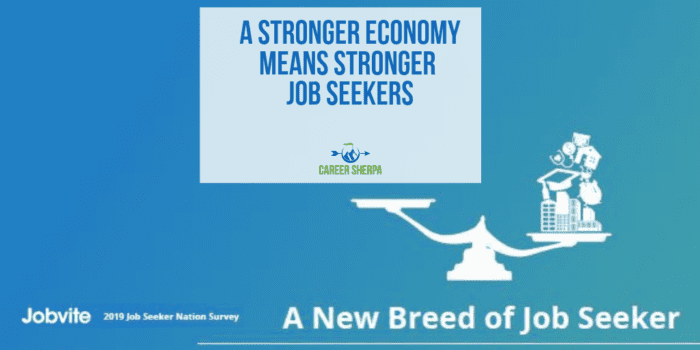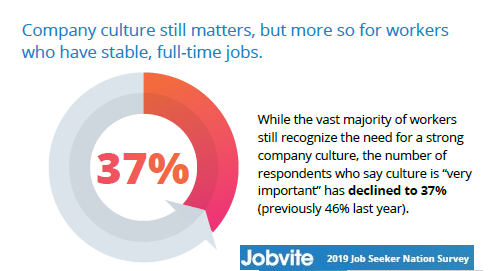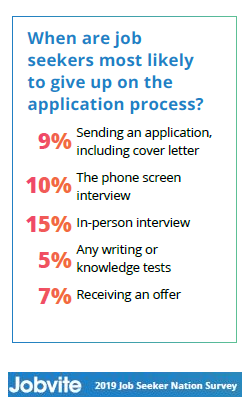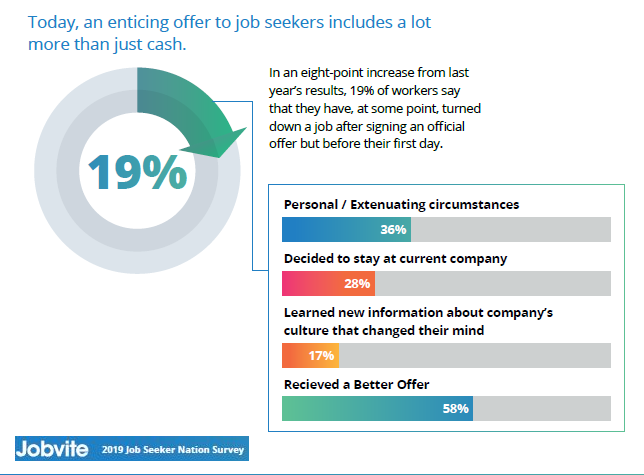This year’s Job Seeker Nation study by Jobvite highlights job search trends from the candidate’s perspective. If you are actively or passively looking for a new job, you’ll want to see what the competition is doing and become a stronger job seeker.
It may be a candidate’s job market, but even if you have the upper hand, you don’t want to go into your job search blind. Every job seeker should know about what their job-seeking competition is doing.
That is exactly what you’ll learn in Jobvite’s recent annual report.
Looking For A New Job?
45% of job seekers say it’s harder to find a job than last year. But 20% of job seekers said it’s easier finding work.
While 68% of respondents reported being satisfied with their jobs today (up from 61% last year), a majority still say they’re open to other opportunities. In fact, a large percentage of respondents said they applied to a job with no intention of leaving their current role.
Testing the water, getting an idea for what jobs are out there and how the process works help keep your job seeking skills fresh!
Full-Time Work Over Part-Time Work
Now is the perfect time to search for full-time employment! 59% of survey respondents who currently work part-time say they’re looking for full-time work even though they are considered “employed.” Most likely these people took part-time work to fill a gap in employment and never really wanted part-time work.
Job Seekers Want Career Growth
In the past, people were looking for a new job in order to make more money. But this year, career growth opportunities ranked as the most important factor when looking for a new job at 61% of respondents. 57% rated compensation as an important factor and 58% cite healthcare/retirement benefits as important factors.
This is especially true for younger workers (65%). But the unemployed were less likely to prioritize career growth (51%).
Job Descriptions Stink
Only 47% of workers believe that job descriptions reflect actual job responsibilities.
Where To Find Jobs
Online job boards are still the most popular source for finding job openings according to 69% of respondents. But 41% of younger workers are most likely to search for jobs on social media.
Almost 50% of respondents hear about jobs by word of mouth via friends, while 37% say they also learn through professional networks.
When candidates submit job applications, the most popular places area online job boards and employer career sites. This means that even though they may hear about a job through their network or see a job on social media, candidates still apply through online applications.
Employed Job Seekers Have It Better
38% of employed workers use professional networks to find that next opportunity versus 18% who are unemployed.
48% of employed workers are also more likely to apply for positions where they do not meet the skill requirements versus 34% of unemployed.
Culture Matters
We hear a lot about finding a job with a good cultural fit. Last year’s study found that 46% of respondents felt cultural fit was “very important” however that number dropped to 37% this year.
With more people employed than last year, you would think that more people would hone in on cultural fit this year. It’s still important and should be assessed carefully during your research and the interview process.
Dropping Out of The Application Process
Job seekers have to balance their time and energy between working and enduring the application process. 15% drop out after the in-person interview. And only 7% reported “ghosting” a recruiter after an interview.
This is good news for those who are truly interested in the jobs and companies they apply to! Be persistent and follow up with recruiters when you are very interested in opportunities. You may have a better chance than you think, especially if the top candidate drops out.
Just Say Yes To Texting
64% of workers who received a text message after applying for a job preferred this type of communication over email or phone call. And users respond on average in just 90 seconds. 95% of texts will be read within the first three minutes.
It’s no wonder recruiters are texting instead of emailing. Note that younger candidates are much more likely to get a text and like to.
Older job seekers may be better able to compete against younger candidates by texting. Don’t list your home phone number on your resume/application. Use your cellular.
Savvier Negotiators
60% of job seekers now report being at least somewhat comfortable negotiating, up from 51% who felt so
last year.
This means you’ll need to up your negotiation skills. Conduct thorough research on the company’s benefits and policies and don’t be afraid to ask for what you want. The worse they can do is say they can’t meet your expectations.
Reject An Offer If Necessary
Even when candidates got an offer and accepted it, 19% have walked away before starting the job. The reasons varied from getting a better offer to personal circumstances. It’s important to point out that Jobvite noted an uptick in the number of respondents who backed away from an offer this year.
Most career coaches and advisors would strongly advise against reneging on an offer. However, this does show a shift in how candidates view commitment to a company versus taking care of their own needs.
It is important to note that only 6% of respondents said they quit their job without notifying their employer first.
About The Study
Jobvite surveyed 1,504 adults in the US who are working full-time, part-time or looking for work.
If you want to see the full report, it is available here.

Hannah Morgan speaks and writes about job search and career strategies. She founded CareerSherpa.net to educate professionals on how to maneuver through today’s job search process. Hannah was nominated as a LinkedIn Top Voice in Job Search and Careers and is a regular contributor to US News & World Report. She has been quoted by media outlets, including Forbes, USA Today, Money Magazine, Huffington Post, as well as many other publications. She is also author of The Infographic Resume and co-author of Social Networking for Business Success.







